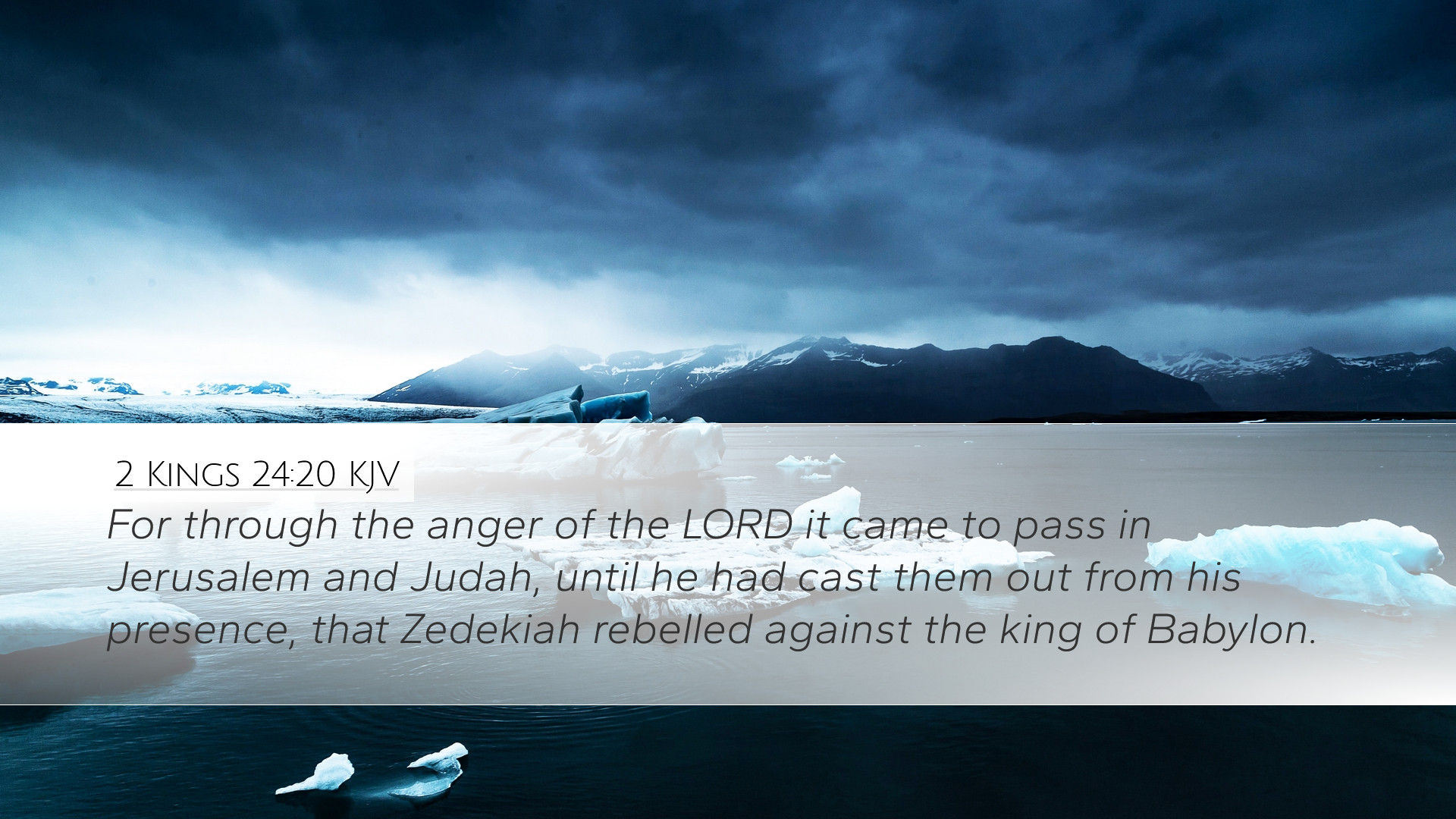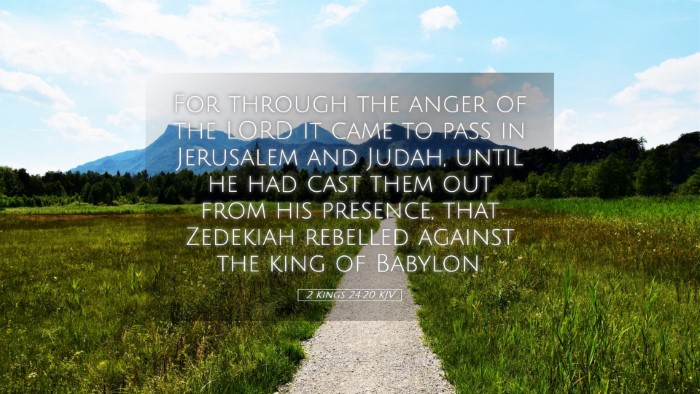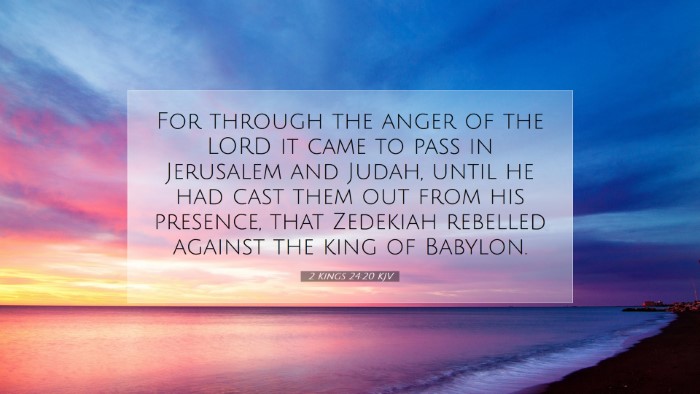Old Testament
Genesis Exodus Leviticus Numbers Deuteronomy Joshua Judges Ruth 1 Samuel 2 Samuel 1 Kings 2 Kings 1 Chronicles 2 Chronicles Ezra Nehemiah Esther Job Psalms Proverbs Ecclesiastes Song of Solomon Isaiah Jeremiah Lamentations Ezekiel Daniel Hosea Joel Amos Obadiah Jonah Micah Nahum Habakkuk Zephaniah Haggai Zechariah Malachi2 Kings 24:20
2 Kings 24:20 KJV
For through the anger of the LORD it came to pass in Jerusalem and Judah, until he had cast them out from his presence, that Zedekiah rebelled against the king of Babylon.
2 Kings 24:20 Bible Commentary
Commentary on 2 Kings 24:20
Verse: "For through the anger of the LORD it came to pass in Jerusalem and Judah, until he had cast them out from his presence, that Zedekiah rebelled against the king of Babylon."
Introduction
The passage of 2 Kings 24:20 captures a critical moment in Israel’s history, illustrating the divine judgment upon the nation due to persistent disobedience. It serves as a reminder of the consequences of turning away from God and the fulfillment of prophetic judgments. This commentary will synthesize insights from eminent public domain commentaries to provide a deeper understanding of this verse.
The Context of 2 Kings 24
The historical setting of 2 Kings 24 reveals the decline of Judah as a sovereign nation under the reign of King Zedekiah. His rebellion against Babylon is addressed in this verse, highlighting the gravity of Israel's spiritual condition leading to God's decisive action. The context provides a window into the reasons behind the Lord’s anger and the ultimate downfall of Jerusalem.
Matthew Henry's Perspective
Matthew Henry emphasizes that the verse demonstrates the anger of God as a response to Israel's unfaithfulness. He notes that despite previous warnings, the people continued in their idolatry and sin. Henry points out:
- Divine Discipline: The Lord’s anger is not without cause; it serves as divine discipline. The exile is seen as a direct result of Zedekiah’s rebellion and the nation's collective failure to heed God's commands.
- Rejection of God: Henry highlights that being cast out from God's presence signifies their rejection of God. It is a grave consequence that reflects the spiritual state of the people.
- Historical Consequences: He provides insights into the correlation between sin and national downfall, reminding readers that individual and communal responsibilities lead to dire consequences.
Albert Barnes' Insights
Albert Barnes offers a detailed analysis of the motives behind Zedekiah’s rebellion. He suggests several key points:
- Political Motivations: Barnes asserts that the rebellion was not purely spiritual but stemmed from political pressures and ambitions, showcasing Zedekiah's failure to trust God's plan.
- God’s Sovereignty: He illustrates that God’s anger is a manifestation of his sovereign authority over nations. The casting away from His presence reflects a larger theological principle where divine justice prevails.
- Call to Repentance: Barnes emphasizes that despite the dire circumstances, hope for repentance remained available to Zedekiah and the people, challenging readers to consider their own spiritual state.
Adam Clarke’s Detailed Commentary
Adam Clarke provides an exhaustive examination of the implications of this verse. He focuses on:
- Covenantal Faithfulness: Clarke urges readers to understand God’s anger in the context of His covenant with Israel. The breach of covenant resulted in severe repercussions, particularly highlighting the historical significance of these events.
- Character of Zedekiah: He scrutinizes Zedekiah’s character, describing him as lacking wisdom and foresight, ultimately labeling him as morally weak in the face of overwhelming circumstances.
- Societal Reflection: Clarke encourages contemporary readers to reflect on their society's spiritual dynamics, drawing parallels with Judah’s fate and advocating for a return to righteousness.
Theological Implications
This verse raises significant theological discussions regarding:
- The Nature of Divine Anger: The anger of the Lord as depicted in this verse emphasizes God’s holiness and His intolerance of sin. The commentary aligns with the broader biblical narrative that portrays God as just, yet merciful.
- Human Responsibility: The rebellion of Zedekiah serves as a case study for human responsibility in the grand tapestry of God's redemptive plan. It calls believers to recognize the weight of their choices.
- Hope Amidst Judgment: Despite judgment, the overarching theme of hope is evident in Scripture. While Zedekiah’s actions led to dire consequences, the prophetic books allude to eventual restoration for the faithful remnant.
Application for Today
The lessons drawn from 2 Kings 24:20 resonate deeply in today’s context. For pastors, theologians, and Bible students, the following applications emerge:
- Spiritual Vigilance: Believers are reminded to remain vigilant in their spiritual lives, recognizing the dangers of complacency and rebellion against God's directives.
- Understanding God’s Justice: This passage prompts reflection on the justice of God. Contemporary Christians are urged to uphold God's standards in a world that often contradicts them.
- Repentance and Restoration: The assurance that God is a God of second chances calls individuals and communities to pursue repentance and seek restoration through Christ.
Conclusion
In sum, 2 Kings 24:20 stands as a sobering reminder of the implications of rebellion against God. Through the insights of Matthew Henry, Albert Barnes, and Adam Clarke, we grasp not only the historical context of this warning but also its enduring relevance. The anger of the Lord serves as a call to righteousness and the relentless grace of God awaits those who seek Him. As we study this passage and draw from the depth of biblical commentaries, may we be inspired to live faithfully amidst the challenges of our own times.


